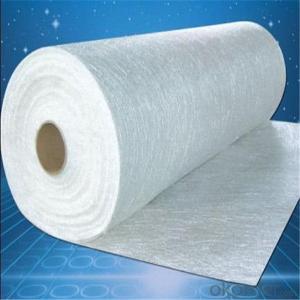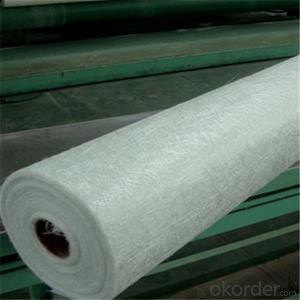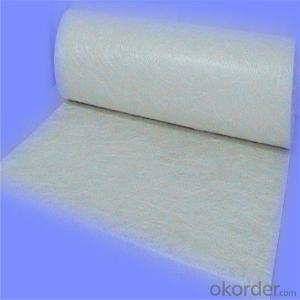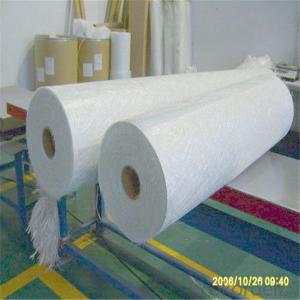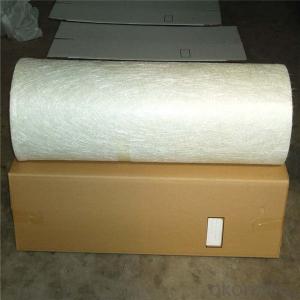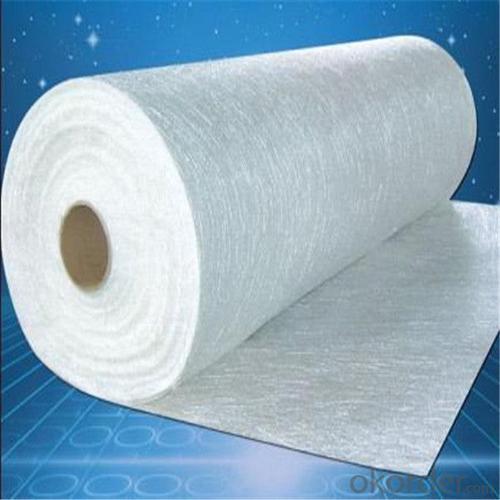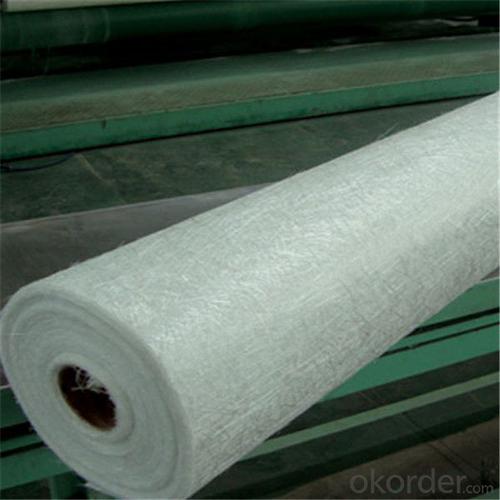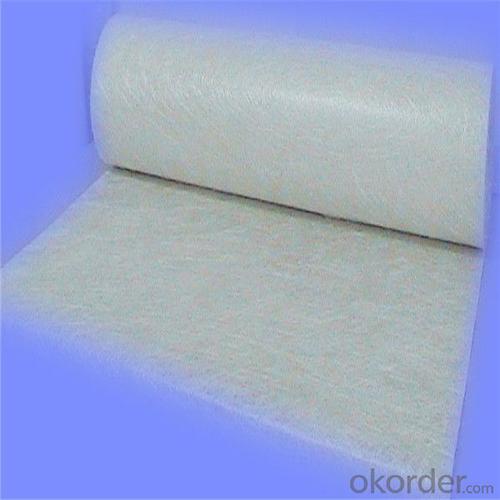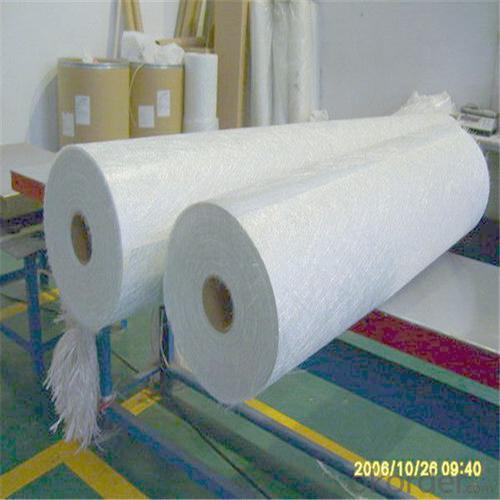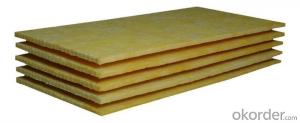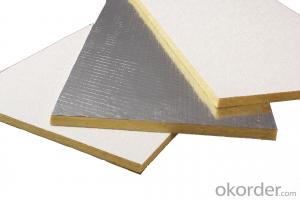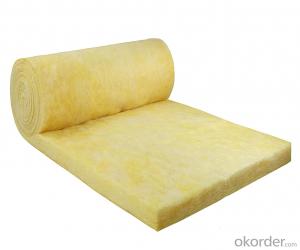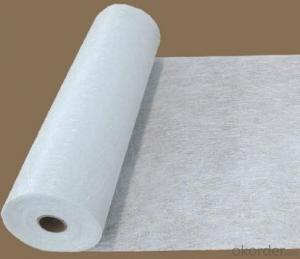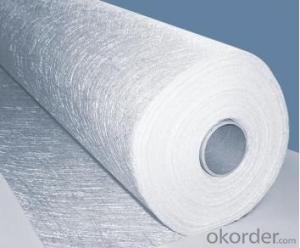Fiberglass Mat Tissue - Chopped Strand Mats 450/g
- Loading Port:
- Tianjin
- Payment Terms:
- TT OR LC
- Min Order Qty:
- 100 m.t.
- Supply Capability:
- 20000 m.t./month
OKorder Service Pledge
Quality Product, Order Online Tracking, Timely Delivery
OKorder Financial Service
Credit Rating, Credit Services, Credit Purchasing
You Might Also Like
Quick Details
| Technique: | Chopped Strand Fiberglass Mat (CSM) | Dimensions: | 450gsm | Mat Type: | Continuous Filament Mat |
| Fiberglass Type: | E-Glass | Softness: | softness | Place of Origin: | Jiangxi, China (Mainland) |
| Brand Name: | cnbm | Model Number: | 450gsm | color: | white |
| fiberglass type: | E glass | product: | e-glass powder chopped stand mats | binder: | powder or emulsion |
| width: | 1040 or 1270mm, as your requirement | weight: | 30 or 45kg/roll | paper tube diameter: | 90mm |
| outer diameter of roll: | 256mm | packing: | plastic film+carton box + pallet |
Packaging & Delivery
| Packaging Details: | plastic film+carton box + pallet |
| Delivery Detail: | 15-20days |
Specifications
1.e-glass powder chopped stand mats
2.binder:power or emulsion
3.width:1040mm or 1270mm
4.weight:450gsm
Picture
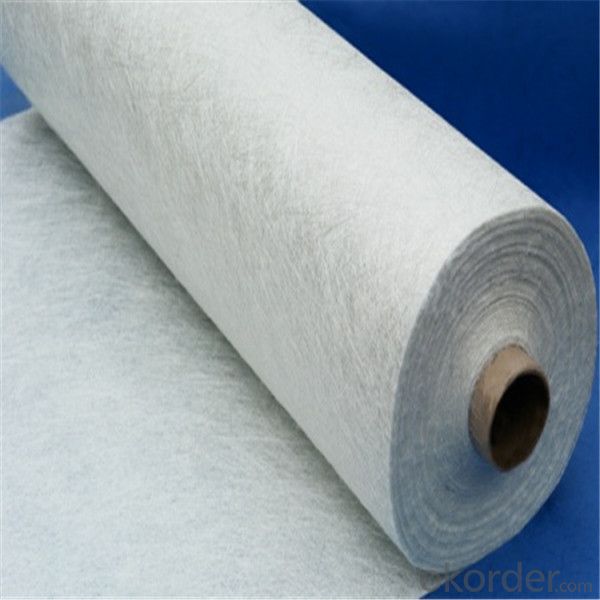
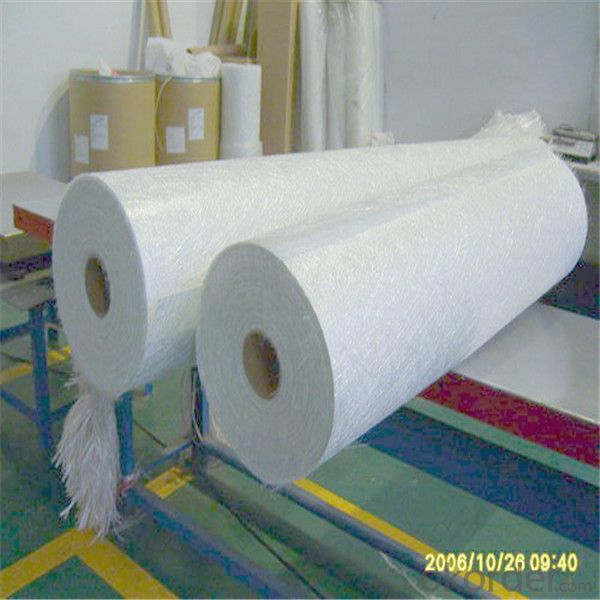
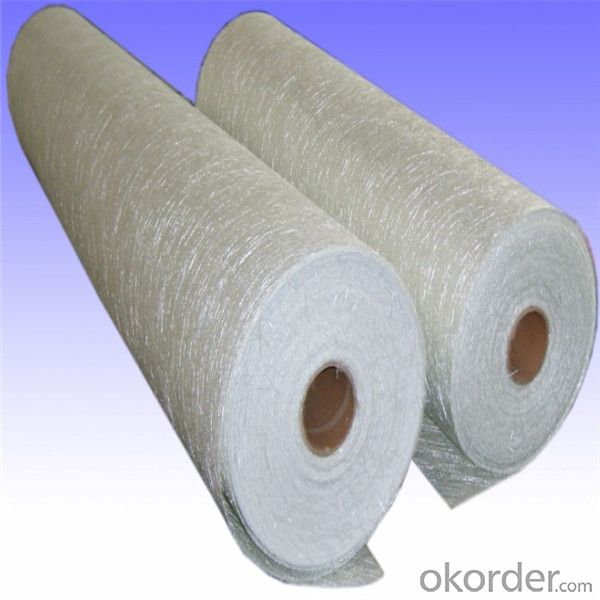
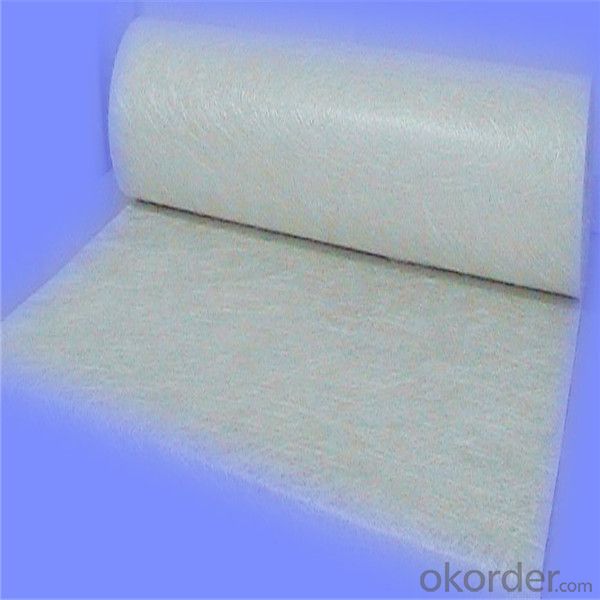
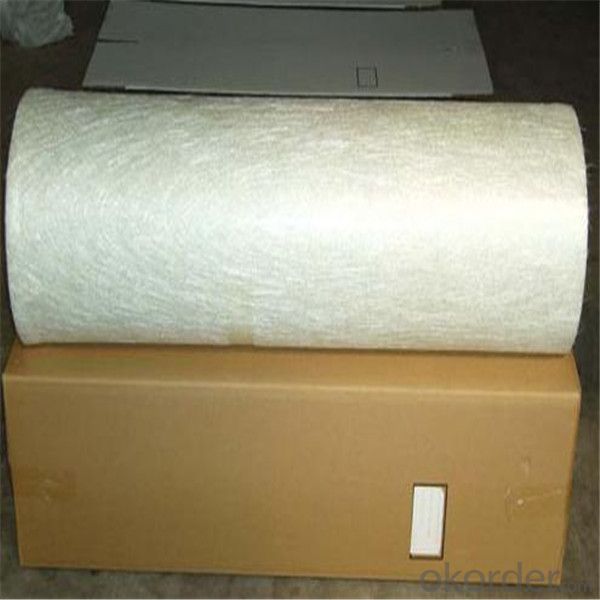
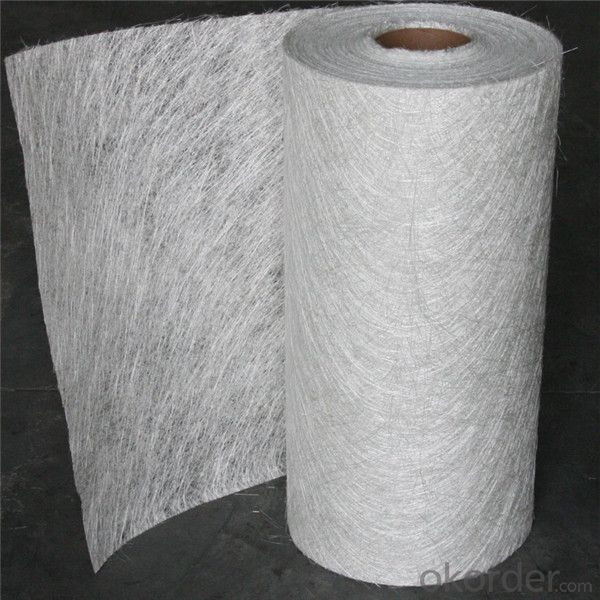
- Q: What is the UV resistance of fiberglass mat tissue?
- The UV resistance of fiberglass mat tissue can vary depending on the specific formulation and manufacturing process used. Generally, fiberglass mat tissue is known for its excellent resistance to ultraviolet (UV) radiation. The fiberglass strands used in the mat are typically coated with a resin or binder that provides added protection against UV degradation. This coating helps to prevent the fibers from breaking down or becoming brittle when exposed to sunlight. Additionally, the structure of the fiberglass mat tissue itself provides a degree of natural UV resistance due to its dense and tightly woven construction. However, it is important to note that prolonged exposure to intense UV radiation can still cause some degree of degradation over time. Therefore, it is recommended to consult the specific product specifications or manufacturer's guidelines for accurate information on the UV resistance of a particular fiberglass mat tissue.
- Q: What is the thickness range of fiberglass mat tissue?
- The thickness of fiberglass mat tissue may vary depending on the product and manufacturer at hand. Generally, one can find fiberglass mat tissues in thicknesses that span from 0.1mm to 1mm. It is worth emphasizing that the thickness of the fiberglass mat tissue plays a significant role in determining its strength, flexibility, and various other qualities. Therefore, it is imperative to carefully choose the suitable thickness that aligns with the intended application.
- Q: What are the different fabric finishes available for fiberglass mat tissue?
- Fiberglass mat tissue offers several fabric finishes, each with its own unique properties and characteristics. Let's explore some of the most common finishes available: 1. Polyester: Widely used in fiberglass mat tissue, polyester fabric finishes provide excellent strength and durability. This finish improves tear resistance and tensile strength. 2. Polypropylene: Known for its high resistance to chemicals and moisture, polypropylene fabric finishes enhance water resistance properties. Ideal for applications where moisture or chemical exposure is a concern. 3. Acrylic: Acrylic fabric finishes offer good heat resistance and flame retardancy. They improve the material's thermal stability and fire resistance, making it suitable for high-temperature or fire-prone environments. 4. Nylon: Renowned for its excellent abrasion resistance and toughness, nylon fabric finishes enhance durability and wear resistance. Perfect for applications involving frequent contact or friction. 5. Polyethylene: With outstanding resistance to moisture and chemicals, polyethylene fabric finishes improve water repellency and chemical resistance. Ideal for outdoor or corrosive environments. 6. Polyurethane: Polyurethane fabric finishes provide flexibility and elasticity to fiberglass mat tissue. They enhance the material's ability to withstand bending and stretching without breaking or tearing. When selecting a fabric finish for fiberglass mat tissue, it's essential to consider specific application requirements. Factors such as strength, durability, water resistance, flame retardancy, abrasion resistance, and chemical resistance should all be taken into account to choose the appropriate finish.
- Q: Is fiberglass mat tissue resistant to oil and grease?
- Yes, fiberglass mat tissue is resistant to oil and grease. The composition of fiberglass mat tissue consists of fine strands of glass fibers bonded together with a resin. This resin acts as a barrier that prevents oil and grease from penetrating through the mat tissue, making it resistant to these substances. Additionally, fiberglass itself is known for its non-reactive properties, which further enhances its resistance to oil and grease. Therefore, fiberglass mat tissue is an ideal material for applications where contact with oil and grease is expected, such as in industrial settings or automotive components.
- Q: What are the potential limitations of using fiberglass mat tissue?
- Some potential limitations of using fiberglass mat tissue include the risk of skin irritation or allergic reactions when handling the material, as well as the need for proper safety precautions to prevent inhalation of fibers. Additionally, fiberglass mat tissue may not be suitable for applications requiring high strength or resistance to extreme temperatures.
- Q: How thick is fiberglass mat tissue typically?
- Fiberglass mat tissue typically has a thickness ranging from 0.3 to 0.6 millimeters.
- Q: What are the applications of fiberglass mat tissue?
- Fiberglass mat tissue, a versatile material, is utilized in a multitude of industries. Some notable applications include: 1. Construction and Building Materials: Within the construction industry, fiberglass mat tissue serves as a reinforcement material. It is commonly employed in the production of roofing shingles, insulation materials, and wall coverings. The robust and durable nature of fiberglass mat tissue enhances the structural integrity of buildings and bolsters their resistance to external elements such as wind, moisture, and temperature fluctuations. 2. Automotive Industry: The automotive sector extensively utilizes fiberglass mat tissue for manufacturing components like door panels, headliners, trunk liners, and interior trim parts. Due to its lightweight and high strength properties, fiberglass mat tissue is an ideal material for reducing the overall weight of vehicles while maintaining their structural integrity. 3. Marine Industry: The marine industry relies heavily on fiberglass mat tissue for constructing boat hulls, decks, and other structural components. The corrosion-resistant characteristics of fiberglass mat tissue make it well-suited for marine applications where exposure to water and harsh weather conditions is common. 4. Pipe Manufacturing: Fiberglass mat tissue is employed in the production of fiberglass reinforced pipes. These pipes find applications in various industries, including oil and gas, chemicals, and water management. The high strength and corrosion-resistant properties of fiberglass mat tissue make it an excellent choice for manufacturing pipes capable of withstanding high pressure and harsh chemical environments. 5. Filtration Systems: Fiberglass mat tissue plays a vital role in the production of air filters and liquid filtration systems. The fibrous structure of the material enables efficient filtration by trapping dust particles, dirt, and other contaminants. This makes fiberglass mat tissue the preferred choice for applications requiring high-efficiency filtration, such as HVAC systems, industrial air filters, and water treatment plants. In conclusion, fiberglass mat tissue finds extensive and diverse applications in industries ranging from construction and automotive to marine and filtration systems. Its unique properties make it an invaluable material for enhancing structural integrity, reducing weight, and improving performance across various sectors.
- Q: Is fiberglass mat tissue suitable for aerospace applications?
- Fiberglass mat tissue proves to be a suitable choice for aerospace applications. Its lightweight composition and remarkable durability render it an excellent option for critical aerospace uses where reducing weight and ensuring structural integrity are of utmost importance. Typically employed as a reinforcing material in composite structures and aerospace components like wings, fuselages, and engine parts, fiberglass mat tissue provides exceptional impact resistance, commendable thermal stability, and minimal moisture absorption. These vital characteristics enable it to withstand the challenging conditions and extreme temperatures encountered in aerospace environments. Moreover, fiberglass mat tissue exhibits commendable electrical insulation properties, making it well-suited for applications requiring effective electrical shielding. Overall, owing to its outstanding mechanical properties, lightweight essence, and ability to endure the demanding circumstances prevalent in aerospace applications, fiberglass mat tissue stands as a dependable and extensively utilized material within the aerospace industry.
- Q: What are the potential health hazards associated with working with fiberglass mat tissue?
- Working with fiberglass mat tissue can pose several potential health hazards due to the nature of the material. One primary concern is the inhalation of fiberglass particles, which can cause respiratory issues. When fiberglass is cut or handled, it releases small particles into the air that can be easily inhaled. Prolonged exposure to these particles may lead to throat and lung irritation, coughing, and difficulty breathing. Another potential health hazard associated with fiberglass mat tissue is skin irritation. The tiny fibers from the material can irritate the skin upon contact, causing redness, itching, and rashes. In some cases, prolonged exposure or repeated contact with fiberglass can result in more severe skin conditions such as dermatitis. Furthermore, fiberglass mat tissue can also cause eye irritation and damage. If fibers come into contact with the eyes, they can cause redness, itching, watering, and even corneal abrasions. It is important to wear appropriate eye protection, such as goggles, to prevent any potential eye injuries while working with fiberglass. To mitigate these potential health hazards, it is crucial to follow safety guidelines and use personal protective equipment (PPE) when working with fiberglass mat tissue. This includes wearing a respirator mask to prevent inhalation of particles, using gloves and protective clothing to minimize skin contact, and wearing safety goggles to protect the eyes. Regular cleaning and good hygiene practices are also essential to minimize any potential health risks associated with fiberglass. It is important to clean work areas properly to remove any loose fibers, and to wash hands and exposed skin thoroughly after working with fiberglass. Overall, while working with fiberglass mat tissue can present potential health hazards, taking appropriate safety precautions and following safety guidelines can significantly reduce the risk of any adverse health effects.
- Q: What is the thermal stability of fiberglass mat tissue?
- The thermal stability of fiberglass mat tissue is quite high. It can withstand high temperatures without significant degradation or loss of its structural integrity.
Send your message to us
Fiberglass Mat Tissue - Chopped Strand Mats 450/g
- Loading Port:
- Tianjin
- Payment Terms:
- TT OR LC
- Min Order Qty:
- 100 m.t.
- Supply Capability:
- 20000 m.t./month
OKorder Service Pledge
Quality Product, Order Online Tracking, Timely Delivery
OKorder Financial Service
Credit Rating, Credit Services, Credit Purchasing
Similar products
Hot products
Hot Searches
Related keywords
